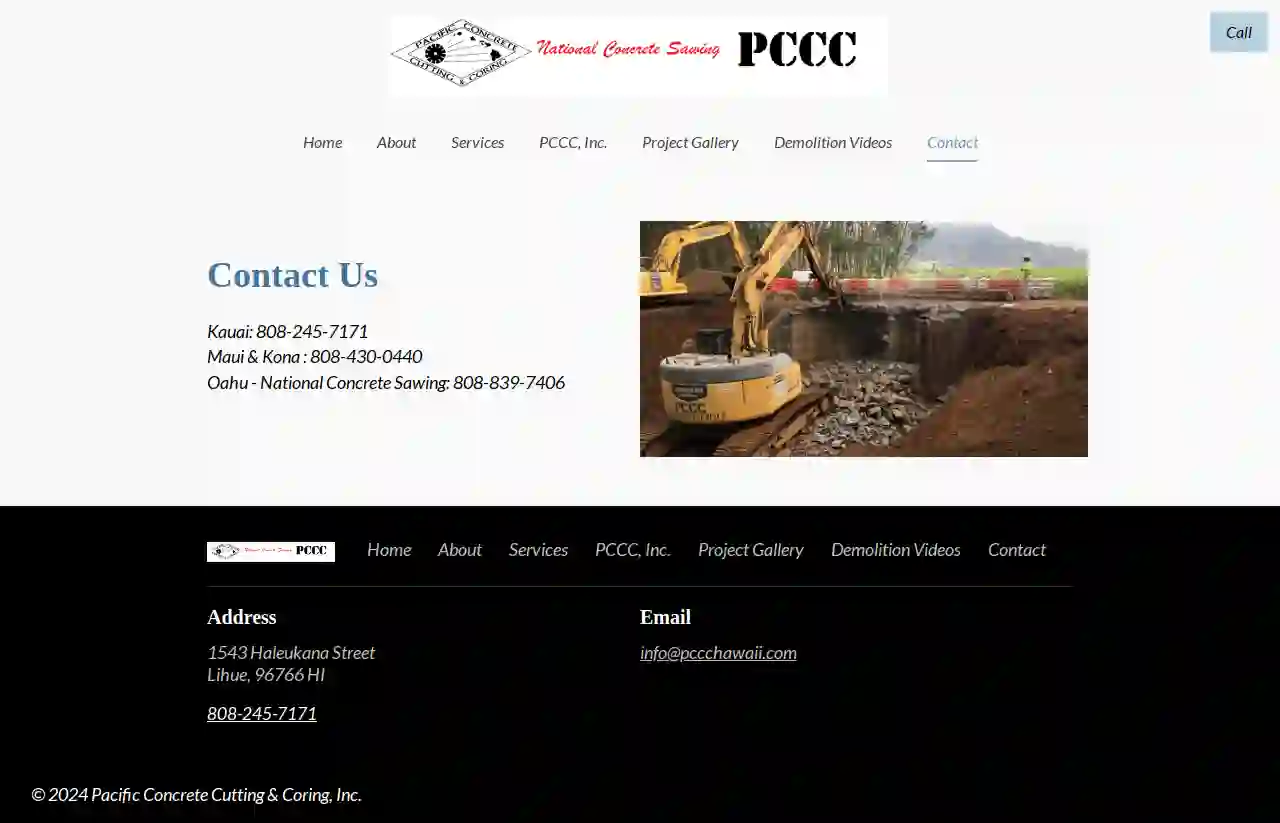Excavation Contractors Captain Cook
Find Land Excavation in Captain Cook
Get multiple Excavating Contractors quotes for your project today! Compare profiles, reviews, accreditations, portfolio, etc... and choose the best deal.

Unlimited Landscape Hawaii LLC
4.25 reviews1723 Glen Avenue, Wahiawa, 96786, USWelcome to Our Site! Unlimited Landscape Hawaii LLC is the most reliable and affordable full-service landscape and lawn care company in Honolulu, Hawaii. We have extensive experience in the lawn care business, and are proud to serve residential and commercial properties throughout the island of Oahu. We offer a variety of landscape, lawn services, fencing and concrete work to suit each clients' individual needs. Our companies strive for excellence and commitment to customer satisfaction provides the foundation for our business and work ethics. Thus, producing excellent work and satisfied customers. At Unlimited Landscape Hawaii LLC, it is our goal to provide you with a wide range of landscape and lawn services to suit your everyday lifestyle. Our knowledgeable staff is available to assist you with all aspects of your landscape project. We will work one-on-one with you to discuss your design ideas and create a landscape plan to bring your vision to life. Whether you are a contractor, architect or homeowner, we are delighted to assist you in every way. Call today to speak with one of our friendly staff members, and schedule your Free estimate!
- Services
- Why Us?
- Testimonials
- Gallery
Get Quote
Ching Construction
4.52 reviews730 D Moowaa St., Honolulu, 96817, USAbout Ching Construction Ching Construction is a Hawaii owned and operated, certified 8(a) general contracting company. Founded in 1991, our company has completed a wide variety of projects, including tenant improvements, hotel renovations, historical renovations, commercial, medical, and resort remodeling, and new construction of low and mid-rise buildings, light industrial facilities, and custom residences. We also have experience working within the government sector. This capability is evidenced by the successful completion of projects for the State of Hawaii Harbors Division, Department of Accounting and General Services, and the US Army Public Works Department. Ching Construction consistently delivers a quality product, on time, and within budget. We pride ourselves in giving realistic estimates, meaningful value engineering, timely and detailed communication, utilizing the latest technology while never losing sight of doing a job that reflects the highest finish standards in the industry. We believe that the success of any contracting job, big or small, lies in the team and the communication established between the team members. We are big proponents of partnering, which brings the client, architect, contractor, and other contributors together fully committed to the job's success. We pride ourselves in creating a good working rapport with our colleagues in every job we do. For larger projects, Ching Construction has an ongoing formal partnering agreement with The Shaw Group. Based out of Baton Rouge, Louisiana, Shaw is a global corporation with over 17,000 employees and $3.5 billion in revenue. Shaw's vast resources give it unparalleled capability in environmental assessment and solutions, facility design and construction, facilities management and privatization, homeland security and emergency preparedness, management consulting, and real estate restoration. Maintaining a full-time Honolulu staff of 86, combined with the resources of Ching Construction's 22 skilled professionals, we are prepared to undertake any project, large or small. Ching Construction can move quickly. We can bid a job today and start work tomorrow, even without fully developed plans. When you are contemplating your next project, large or small, private or commercial in our beautiful Aloha state, think of Ching Construction. We would be honored to discuss your project, give you an honest, fair, and competitive bid, and then roll up our sleeves and get right to work.
- Services
- Why Us?
- Gallery
Get Quote
Roto-Rooter Plumbing & Water Cleanup
4.8Honolulu, USYour Local Roto-Rooter Plumber in Honolulu, HI When you need a plumber in Honolulu, look no further than Roto-Rooter. Our skilled local plumbing professionals have the expertise and cutting-edge equipment to handle any plumbing problem, from clogged drains and burst pipes to sewer line issues. We're here to help you get your plumbing back in working order as quickly as possible so you can get on with your life. 24/7 Service for Your Peace of Mind Roto-Rooter provides 24/7 service, 365 days a year, because plumbing emergencies don't stick to a nine-to-five schedule. When you call Roto-Rooter of Honolulu, you can count on: Same-day service 24/7 availability Professional, experienced plumbers Industry-leading equipment Competitive rates Attractive financing options Dedicated to Honolulu Roto-Rooter’s Honolulu plumbers serve O’ahu residents and businesses with courtesy, speed, and efficiency. More people rely on us than any other plumbing company in the United States. Your plumbing is our priority, and we'll ensure it flows smoothly. Call us at 808-842-5680 or use our online scheduling form. Comprehensive Plumbing Solutions in Honolulu Roto-Rooter is a trusted provider of plumbing solutions for homes and businesses. Our dedicated plumbers
- Services
- Why Us?
- Testimonials
- Gallery
Get Quote
Hawaii Geophysical Services LLC
51 reviewsHonolulu, USHawaii Geophysical Services: Your Local Technological Leader Hawaii Geophysical Services is a technological leader in the design and innovation of surface and ground penetrating radar (GPR) systems. We've been serving the community for 17 years, dedicated to providing accurate and timely services that help our customers achieve project success. If you need to see what lies beneath the surface, our radar systems can safely help you define what you can't see with the naked eye. We pride ourselves on offering innovative solutions to your problems. Our team utilizes the latest technologies and trends to deliver a wide range of services. We believe our experience can enhance your action plan and lead to new opportunities. We have a strong network of partners, allowing us to work together to take care of business and ensure successful projects. Our team is committed to answering your questions and finding solutions for any issue. Contact us today to learn more about how we can help you.
- Services
- Why Us?
- Gallery
Get Quote
Hawaii Pacific Excavation
51 reviewsHonolulu, USAbout Hawaii Pacific Excavation Hawaii Pacific Excavation is a locally owned and operated family business with generations of experience in heavy equipment and construction. Nicholas Pestana, the founder and CEO, is the third generation of his family to work in this industry in Hawaii. He grew up learning the business from his grandfather and father, gaining valuable experience in operations, sales, operating equipment, and mechanical work. In 2013, Nicholas left the family business to start Hawaii Pacific Excavation, bringing with him a wealth of knowledge and experience. Hawaii Pacific Excavation is committed to providing top-notch services and building lasting relationships with our clients. We have a deep understanding of the industry and a strong appreciation for Hawaii's culture, people, and terrain, which allows us to offer a wide range of services for homeowners and commercial businesses. At Hawaii Pacific Excavation, we provide unmatched service and attention to detail. Whether you are a homeowner or a project manager, we can meet your needs.
- Services
- Why Us?
- Our Team
- Testimonials
- Gallery
Get Quote
Jayar Construction
51 reviews1176 Sand Island Parkway, Honolulu, 96819, USOur Story Jayar Construction was founded in 1987 by Rodney Nohara and his former partner. Since then, our company has grown to become what it is today. We currently specialize in site-work for building projects and infrastructure work for subdivisions. We perform work on the islands of Oahu and Maui in the state of Hawaii.
- Services
- Why Us?
- Gallery
Get Quote
Construction Materials Hawaii
54 reviews2696 Kilihau St., Honolulu, 96819, USConstruction Materials: Your Local Kama'aina Company Serving Hawai'i Since 1971 Construction Materials began in 1969. The founders, Florence and Bob, incorporated Robert P. Freitas Ent., Inc. in 1971. Bob, a graduate of Kaimuki High School and a retired Master Sergeant from Hawaii's National Guard, is best known for his quick witted humor and hilarious jokes. His wife Florence, the company's best kept secret, is the one lady who managed to fill any position whenever necessary. We love you Mom... On August 5, 2016, the Corporation transferred to the next generation. We are happy to have maintained the Aloha Spirit provided by Mom and Dad. The website is our way of offering you 24/7 service and pick up or will call Monday through Friday 6:30 AM to 4:00 PM. After 50 years in business, it's likely we still have what you need, even if it's not on our website. For emergency issues, call (808) 285-7918 and please feel free to order online, e-mail or fax when necessary. The one-on-one relationship has always been key to our success: "We will keep the traditions of our Kupuna (Founders) by maintaining the ‘Mama and Papa’ store tradition and perpetuate new technologies to be first in service." Mahalo
- Services
- Why Us?
- Gallery
Get Quote
Nisa Contractor
57 reviewsHonolulu, USSolid as a Rock Services Welcome to Nisa Contractor, a Family owned Masonry Contractor serving the state of Hawaii since 1992. We provide Masonry Services with experience in Residential & Commercial projects. We use effective methods to ensure we provide you with the best results and assist you with your property renovations, maintenance, or repairs. Depend on us to solve your issues confidently and on time. Our Office NISA CONTRACTOR is dedicated to providing customer satisfaction. We aim to be informative and professional in providing the best options for your needs. For more information about our services, please contact us today! Our Mobile NISA CONTRACTOR is dedicated to providing customer satisfaction. We aim to be informative and professional in providing the best options for your needs. For more information about our services, please contact us today!
- Services
- Why Us?
- Gallery
Get Quote
National Concrete Sawing Inc
51 reviews1543 Haleukana Street, Lihue, 96766, USPacific Concrete Cutting & Coring, Inc. is a Hawaii licensed general contractor ABC-24013 providing concrete and asphalt cutting, coring, abatement, demolition, excavation and grading services throughout the islands. A Concrete Commitment To All Of Our Customers With over 20 years of proven results, Pacific Concrete Cutting & Coring, Inc. continues to provide our clients with exceptional service while continually striving to exceed expectations. Company Profile Pacific Concrete Cutting & Coring, Inc. began more than 20 years ago as a father-son concrete sawcutting company based on the island of Kauai. Today, we are still a family owned business with offices in Lihue, Honolulu, Kailua-Kona, and Wailuku. Our services have continually expanded over the years to meet the ever-changing needs of our clients and now include concrete cutting and removal, coring, demolition, abatement, and grading. Throughout our 20 years of growth and expansion, our philosophy of making client satisfaction our business’s top priority has remained constant. You can count on our team to go out of their way to make sure you are 100 percent satisfied with the work we’ve provided. With a long history of satisfied clients and successful projects, Pacific Concrete Cutting & Coring, Inc. has set the standard for concrete cutting, coring, abatement, and demolition work in Hawaii.
- Services
- Why Us?
- Accreditations
- Gallery
Get Quote
Hawaii Private Locators LLC
1888 Kalakaua Avenue, Suite C-312, 1888 Kalakaua AvenueSuite C-312, Honolulu, 96824, USHawaii Private Locators, LLC Hawaii Private Locators, LLC is a leading provider of underground utility locating services in Hawaii. We offer a wide range of services to meet the needs of our clients, including utility-pipe locating and toning, ground penetrating radar scanning, air excavation and potholing, pipe and sewer HD-camera inspection, manhole-utility vault water extractions, vacuum truck excavations, and pipe depth verification. We serve a wide range of clients, including military, commercial, federal, state, and construction companies. Our team of experienced and certified locators is committed to providing our clients with the highest quality services and the most accurate results. We are dedicated to safety and environmental protection, and we always strive to exceed our clients' expectations. We are committed to providing our clients with the highest quality services and the most accurate results. We are dedicated to safety and environmental protection, and we always strive to exceed our clients' expectations.
- Services
- Why Us?
- Gallery
Get Quote
Over 22,076+ Excavation Companies on our platform
Our excavation contractors operate in Captain Cook and beyond!
ExcavationHQ has curated and vetted the Best Excavation Companies in and around Captain Cook. Find the most trustworthy pro today.
Frequently Asked Questions About Excavation Contractors
- Soil Type and Stability: Stable, cohesive soils allow for deeper excavations than loose or unstable soils.
- Groundwater Level: Excavations below the water table require dewatering techniques to manage water intrusion.
- Equipment and Resources: The size and capabilities of excavation equipment influence the achievable depth.
- Safety Regulations: OSHA and other safety regulations impose limitations on trench depths without proper shoring or sloping.
- Project Requirements: The purpose of the excavation (basement, pool, foundation) determines the necessary depth.
- Experience: Choose contractors with a proven track record and years of experience in excavation projects similar to yours.
- Licensing and Insurance: Verify that they are properly licensed to operate in your area and carry adequate insurance to protect you from liability in case of accidents or damage.
- Equipment and Resources: Ensure they have the necessary equipment and resources to handle your project efficiently and safely.
- Positive Reviews and References: Check online reviews and testimonials from previous customers. Request references and contact them to inquire about their experience with the contractor.
- Professionalism: Opt for a company that communicates clearly, provides detailed and transparent estimates, and has a responsive and courteous team.
- Project Size and Scope: Larger, more complex excavations naturally take longer.
- Soil Conditions: Rocky or challenging soil types can slow down progress.
- Site Accessibility: Limited access might require more time for maneuvering equipment and hauling materials.
- Weather: Inclement weather can cause delays.
- Permitting and Inspections: Waiting for permits or inspections can extend the timeline.
- Clear the Area: Remove any obstacles, including vehicles, outdoor furniture, landscaping features, or structures, from the excavation zone and surrounding area.
- Mark Existing Features: Identify and mark underground utilities, septic tanks, sprinkler systems, or other buried elements you want to protect.
- Protect Landscaping: Use tarps or fencing to shield trees, shrubs, gardens, or other landscaping elements from damage.
- Provide Access: Ensure the excavation contractor has clear access to the work area, including gates wide enough for equipment.
- Discuss Logistics: Coordinate with the contractor regarding parking arrangements, material delivery, and any special instructions or concerns you might have.
How deep can you excavate?
How do I find a good excavation contractor?
How long does an excavation project take?
How do I prepare my property for excavation?
How deep can you excavate?
- Soil Type and Stability: Stable, cohesive soils allow for deeper excavations than loose or unstable soils.
- Groundwater Level: Excavations below the water table require dewatering techniques to manage water intrusion.
- Equipment and Resources: The size and capabilities of excavation equipment influence the achievable depth.
- Safety Regulations: OSHA and other safety regulations impose limitations on trench depths without proper shoring or sloping.
- Project Requirements: The purpose of the excavation (basement, pool, foundation) determines the necessary depth.
How do I find a good excavation contractor?
- Experience: Choose contractors with a proven track record and years of experience in excavation projects similar to yours.
- Licensing and Insurance: Verify that they are properly licensed to operate in your area and carry adequate insurance to protect you from liability in case of accidents or damage.
- Equipment and Resources: Ensure they have the necessary equipment and resources to handle your project efficiently and safely.
- Positive Reviews and References: Check online reviews and testimonials from previous customers. Request references and contact them to inquire about their experience with the contractor.
- Professionalism: Opt for a company that communicates clearly, provides detailed and transparent estimates, and has a responsive and courteous team.
How long does an excavation project take?
- Project Size and Scope: Larger, more complex excavations naturally take longer.
- Soil Conditions: Rocky or challenging soil types can slow down progress.
- Site Accessibility: Limited access might require more time for maneuvering equipment and hauling materials.
- Weather: Inclement weather can cause delays.
- Permitting and Inspections: Waiting for permits or inspections can extend the timeline.
How do I prepare my property for excavation?
- Clear the Area: Remove any obstacles, including vehicles, outdoor furniture, landscaping features, or structures, from the excavation zone and surrounding area.
- Mark Existing Features: Identify and mark underground utilities, septic tanks, sprinkler systems, or other buried elements you want to protect.
- Protect Landscaping: Use tarps or fencing to shield trees, shrubs, gardens, or other landscaping elements from damage.
- Provide Access: Ensure the excavation contractor has clear access to the work area, including gates wide enough for equipment.
- Discuss Logistics: Coordinate with the contractor regarding parking arrangements, material delivery, and any special instructions or concerns you might have.